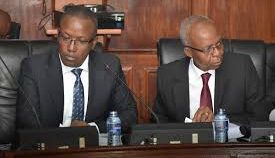The Supreme Court is set to render its much-awaited decision on the Constitution of Kenya (Amendment) Bill, 2020, marking the end of close to two years of a legal battle between the government and a group of citizens opposed to changes to the Constitution.
A seven-judge bench will either give life to the referendum push, or pull the plug on the Building Bridges Initiative (BBI) report which was made public on October 21, 2020, and set Kenya on a path of far-reaching constitutional reforms.
Chief Justice Martha Koome, Deputy CJ Philomena Mwilu and justices Mohamed Ibrahim, Njoki Ndung’u, Smokin Wanjala, Isaack Lenaola and William Ouko will determine whether the BBI process was legal or not and is the Constitution 2010 amendable or not.
Today’s judgment will shake up the country’s political landscape and governance system, the top court’s decision is also likely to sway the outcome of the forthcoming General Election.
DP William Ruto and opposition leader Raila Odinga hold opposing positions on the BBI Bill meaning the Supreme Court’s judgment will be a victory or a loss to one of them.
Borne from the March 2018 handshake between President Uhuru Kenyatta and Raila, the BBI report put forth a raft of proposals that will alter the 2010 Constitution substantively creating a new Constitutional dispensation.
Should the top court allow the BBI process and the proposed amendment to sail through to the next stage of legislation, it will boost Kenyatta’s aspiration of bringing to an end the “winner takes all” ethnic politics and expansion of the Executive, or bury the aspirations altogether.
Executive will be expanded with an aim of creating the Prime Minister’s office which will have executive powers.
In the report, the team proposes that a remodeling of the Parliamentary system is done by bringing the Government back into the House.
This includes the Prime Minister, Deputy Prime Ministers, Cabinet Ministers, the Attorney-General, and the Leader of the Official Opposition, being the person who was the runner-up in the Presidential election.
This is different from what we have right now with the President being the Head of State deputised by his deputy.
The report further notes that the expansion is important in order to promote greater inclusivity and mitigate the drawbacks of the winner-take-all electoral formula.
“This recommendation, therefore, proposes the introduction of the Office of the Prime Minister and two Deputy Prime Ministers,” the report read.
“It also provides that Cabinet Ministers may be appointed from among members of the National Assembly.”
The Committee made this recommendation cognisant of the provisions of Article 77(1) of the Constitution of Kenya which bars state officers from receiving emoluments for more than one role.
This would mean that there would be a President, Deputy President, Prime Minister, two deputy PM, and Cabinet Ministers forming the National Executive.
Additionally, the war against corruption will also receive a boost as one of the proposals is banning public officers from doing business with the government.
The judgment could see the return of a hybrid architecture of government with a leader of an official opposition seat in the National Assembly and a prime minister with two deputies.
Members of Parliament will also be increased because the Bill proposes the creation of 70 additional parliamentary constituencies.
The report noted that the proposed amendments seek to enhance the transparency and fairness of representation in the electoral system.
They include reforming the management structure of the Independent Elections and Boundaries Commission, promote electoral competition based on ideas, values, and our shared humanity rather than the common-enemy identity politics that have defined our electoral cycles to date.
The court will also determine whether the President’s participation rendered the whole exercise moot and if he enjoys absolute immunity.
IEBC quorum will also either tilt the scales of justice in their favour or spell doom for the pro-BBI team.
The fourth issue will be if the court has the powers to intervene in a referendum when the commission has verified one million signatures.
The judges will also determine whether the court had the powe to reverse the will of the people.
Opponents of the BBI asked the Supreme Court to stop BBI by upholding decisions made by the High Court and Court of Appeal, whose judges ruled that sections of the Constitution targeted for amendment can’t be changed.
David Ndii, Jerotich Seii, Jane Ngondi, Wanjiru Gikonyo and Ikal Angelei asked the court to find that the intention of the BBI brigade was to alter the 2010 Constitution.
Among the key issues that Kenyans will be observing is whether the judges will deliver a unanimous judgment or they will each write his/her own judgment as it happened at the Court of Appeal.
Being multiple judges tasked to decide the BBI case, there is thelikelihood of a disagreement on the outcome of the case considering that it involves various issues and at least seven questions.
In such circumstances, there will be two or more decisions – a majority decision, dissenting, or concurring decisions. The majority decision becomes the ruling of the court.
Unlike at the Court of Appeal where there were regular bar-bench engagements during the oral hearing, there was minimal interaction between the judges and advocates at the Supreme Court.






















